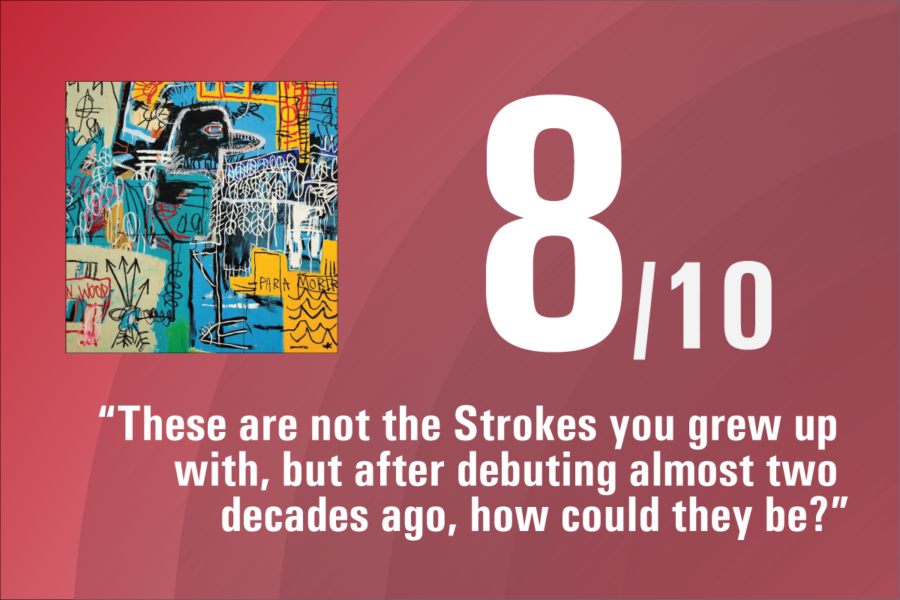Review: ‘The New Abnormal’ reveals a mature version of The Strokes
April 19, 2020
The Strokes’ sixth studio album, and first album in seven years, pays tribute to their influences and past career, while making steps forward with their sound for the band’s most mature album yet.
These are not The Strokes you grew up with, but after debuting “Is This It” almost two decades ago, how could they be? The band whose influence defined modern alt-rock — known for tight pop/garage rock and writing about the frustrations and anxieties of youth — is still there, albeit now 20 years more experienced. Despite their influence on the scene, The Strokes felt they never found their footing. In an interview with the Guardian, Albert Hammond Jr. said each album brought diminished critical success, “so there was never a feeling of: we fucking made it! Roll credits! It was always this kind of half-anxious, half-exciting, ‘What the hell is happening?’”
Since the half-hearted and barely-promoted “Comedown Machine” in 2013, The Strokes have gone separate ways in various side-projects, only reconvening in the studio for the “Future Present Past” EP in 2016. Julian Casablancas flexed his writing chops with two experimental art-rock albums in The Voidz, Nick Valensi went full new-wave with CRX’s last LP and Fabrizio Moretti’s machinegum art collective refined synth-pop for the 2010s. In an interview with Rolling Stone, Casablancas expressed he felt more “on the same wavelength” with The Voidz, “…and with The Strokes it’s more like everyone does what they do.” Even after the frontman’s past misgivings, The Strokes’ comeback is a clear collaborative effort from a group more aligned than ever.
Lead single “At the Door” is an embodiment of The Strokes’ leap in maturity and stands as one of the strongest tracks on “The New Abnormal.” Celestial synths and stripped-back instrumentals feel like a continuation of Moretti’s work with machinegum and nihilist themes in line with Casablancas’ writing for The Voidz. The lyrics are dire; “I can’t escape it/ I’m never gonna make it out of this in time,” Casablancas sings. He feels trapped in a relationship, used up and forced into self-destructive tendencies, dreading loneliness more than anything else. “You begged me not to go/ Sinkin’ like a stone/ Use me like an oar/ And get yourself to shore,” Casablancas sings in the chorus. Psychedelic auto-tuned vocals and arpeggios bridge out into a blissful but heavy close, knowing his only hope is when he’ll “be waiting from the other side.”
Recurring motifs of doors throughout the album’s lyrics show The Strokes at the threshold of something new on “The New Abnormal.” The longer five-minute single is reflected by nearly every song on the album, a massive change in pace for a band whose songs previously rarely crossed four minutes. Tightly written bangers have evolved into more developed and contemplative tracks, a trend that will certainly continue in future releases.
“What we could do next excites me more than I have been excited in, I don’t know, our whole career,” Hammond said in the Guardian interview.
“The Adults are Talking” continues the band’s tradition of excellent openers with danceable post-punk. A classic Strokes guitar melody rocks alongside a simple snare beat, evoking the title track from “Is This It.” Casablancas, always self-aware in his lyricism, bluntly addresses “stockholders” — the devoted fan base who follows their music like gospel — setting the tone for the direction this album is heading. “You are saying all the words I’m dreaming/ Say it after me,” talks to fans who have a skewed perspective of love because of their music.
The opener makes excellent use of its runtime, the song allowing to grow in size from its modest start to a swirling number with dueling guitar solos and long stretches of Casablancas’ singing.
The Strokes pull out their most straightforward songs “Brooklyn Bridge to Chorus” and “Bad Decisions” for energetic high-points before the emotional and slower B-side. The former is a catchy 80s new-wave rocker but suffers from abrasive production. The latter gives writing credits to Billy Idol, a sonic clone of the unmistakable “Dancing with Myself.” While not particularly original, its hooks are memorable and pure fun.
One of the more overtly political songs on the tracklist, “Eternal Summer” features what could possibly be Casablancas’ best vocal performance with crystalline falsetto in the verses, contrasted by Pink Floyd-style, protest-shouted chorus. Hints of uneasiness come out in the verses, “Don’t you want the truth?/ Ignore reality” before cutting back to cliched, “See, I love that feeling too/ Nobody’s gonna stop right now” pop lyrics about love and summer. These are a facade to rising musical tension in the apocalyptic “This is the eleventh hour” chorus. The way these segments switch back and forth is interesting songwriting but ends up as one of the few stumbles on the album, ultimately feeling like a neutered, repurposed Voidz song.
“Ode to the Mets” closes “The New Abnormal” in a final, nostalgic tribute to New York City and The Strokes’ formative years. A quiet opening of guitar and synthesized reed instrument begins to swell when Casablancas calls “Drums please, Fab.” Weeping guitar and wailing vocal melody lead into the last verse, closing the door to the past. “Gone now are the old times,” Casablancas sings. Later ending, “The old ways at the bottom of/ The ocean now has swallowed/ The only thing that’s left is us/ So pardon the silence that you’re hearing/ It’s turnin’ into a deafening, painful, shameful roar.”
The old Strokes are dead; long live The Strokes.







